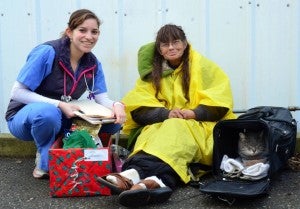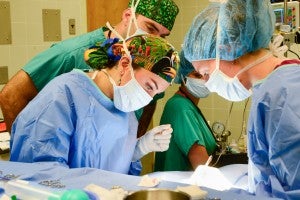“Our human compassion binds us the one to the other – not in pity or patronizingly, but as human beings who have learnt how to turn our common suffering into hope for the future.” – Nelson Mandela
The horrific events of mass killings in San Bernardino shocked all of us and made our world feel less safe and more uncertain. These emotions were particularly felt by our faculty, staff, and students who were at the California Animal Health and Food Safety Laboratory in San Bernardino, located close to the terror event. In those frantic moments immediately following the shootings, their laboratory was on lockdown and, like others near the tragedy, they faced the fear of not knowing what was happening or if those they loved were safe or knew that they were safe.

Rachel Ferris, a third year DVM student, delivers a holiday gift basket to a client at the Mercer Clinic for the Pets of the Homeless in Sacramento. The compassion shown to clients at the clinic brings them hope in times of difficulty.
When an event of that magnitude strikes close to us, we all feel less safe, and face a common reaction of fear and insecurity. A natural reaction following a senseless act of violence is hopelessness and a sense we have no power over the evil we know exists in our world. It is during times like these that we all need to move past our fears and reach out to those most affected by these tragic situations.
Our strength in the school is our ability to be compassionate and to use that emotion to guide us as healers for our animal patients and the people who are connected to those animals. The recent events in California and the world also remind us that we must also comfort those in need with a kind word, gesture, or hug, and let them know that we understand their fears and anxieties. While we may not be able to affect major changes in our society, we can control our own actions toward each other.
Now would be a good time to contact the people who work in the laboratory at San Bernardino and let them know that we understand their apprehension and sense of vulnerability following the terror event that occurred near them. While we are offering resources of support for those affected by the stress of the aftermath of a terror event and enhanced security measures for the laboratory, we must also understand that the human touch, an outreached hand or gesture of random kindness, goes a long ways to let people in need feel less insecure.
With our colleagues in San Bernardino, we share in the common mission of our jobs and in our reaction to tragic events. As we all face an uncertain future, we must come together to support each other and, in that moment, find new strength. Our people and their character to endure in the face of adversity must be balanced by sharing our common grief and sadness when tragedy strikes. In joining in our moment of weakness, we will find our common sense of humanity to help us understand the darkness, while keeping our faith in the future.

